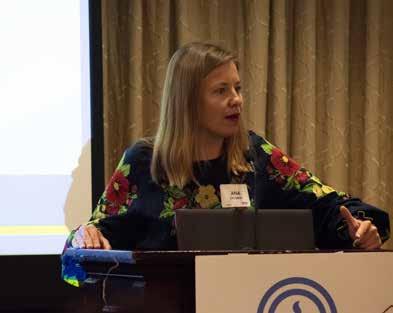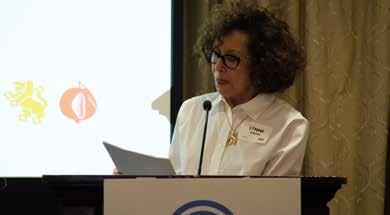
4 minute read
Lion of Judah-Pomegranate Society Supports Federation's 2023 Annual Campaign
The Charlotte Jewish News, May 2023
On March 30, less than a week before Passover and near the close of Women’s History Month, approximately 80 women attended the Lion of Judah-Pomegranate Society Luncheon as part of the Jewish Federation of Greater Charlotte’s (JFGC) 2023 Annual Campaign. Presided over by Lynne Sheffer (Lion of Judah chair) and Kara Culp (Pomegranate Society chair), the luncheon celebrated the impact of the Women’s Philanthropy division of the Annual Campaign.
Last year Federation raised a record $5 million, and women’s philanthropy accounted for onethird of that campaign, raising close to $1.6 million; part of that total came from the Lion of Judah-Pomegranate Society, representing women at giving levels of $1,800 or more (Pomegranate) and $5,000 or more (Lion of Judah).
What brought these women philanthropists together at the luncheon was a belief in their collective responsibility to help not only our Charlotte Jewish community, but also Jews around the world.
Attendees were encouraged to support not only the JFGC’s approximately 70 beneficiary agencies, but also to support one of the four new community initiatives outlined in the program that are necessary for our community’s safety, well-being, and growth: Outshine Hate (combating antisemitism and anti-Israel bias), Strengthening Jewish Identity (providing affordable access to immersive Jewish experiences), Safety and Security (safeguarding our community with training, tools, and resources), and CJE Capital Campaign (modernizing the Levine-Sklut Judaic Library).
The luncheon’s speakers focused on Federation's impact in three areas: Outshine Hate, Jewish Continuity, and Global Impact. After each presentation, a related question was posed and discussed at each of the 10 tables.
Emily Zimmern and Glenda Bernhardt, co-chairs of the Outshine Hate initiative, explained that to combat the trend of rising antisemitism we must speak up, share facts, and show courage. Zimmern laid out statistics from the Anti-Defamation League: “While Jews are only 2.4% of the U.S. population, more than 55% of religious hate crimes in the U.S. target Jews.” In Charlotte and North Carolina there has been a threefold increase. Zimmern explained that antisemitism has an anti-Israel component: “demon[izing] the Jewish state; not just questioning policies, but questioning the right of Israel to exist.”
Tools to combat antisemitism include working with greater community partners through training and education, and teaching our own community how to stand up to hate and violence by expressing Jewish identity and values instead of resorting to “self-erasure” to avoid discomfort.
Bernhardt gave a moving testimonial as to why we must outshine hate: her Jewish identity has informed who she is as a mother, wife, and in her career path. She wants the same for her children: “to live aloud,” and “to be proud of their Judaism.”
On the topic of Jewish Continuity, Berry Zander and two of her daughters, Rachel Reifkind and Karen Spiegler, explained how their own Jewish identity was cultivated by Jewish education, attending Jewish summer camps, and trips to Israel. Many local agencies that the Federation supports, such as Charlotte Jewish Preschool, CJDS, and PJ Library, foster excitement about a Jewish life.
The final speaker, Ana Sazanov, executive director of the Columbia Jewish Federation (CJF), spoke about the global impact of Federation dollars. Sazanov’s slide show began with her as a little girl in Ukraine — her parents didn’t tell her she was Jewish because they lived under oppressive circumstances in the USSR. However, after an ad from the Jewish Agency for Israel aired on radio, her family made aliyah to Israel. She went from being a Jewish girl in Israel to working at Emory Hillel and then CJF. When the war broke out in Ukraine, Sazanov helped raise funds to support partner organizations in Ukraine who were some of the first to welcome refugees at the border because of an infrastructure that had been built up over years.
Sazanov went to the Polish/ Ukraine border to help refugees, the majority of whom only wanted to return home — which wasn’t an option. Her final poignant slide: a violinist playing Hatikvah for Ukrainian refugees on their way to Israel.
Sazanov asked attendees to do what they could to “fulfill the power of tikkun olam” by helping meet the needs of vulnerable Jews in 70 countries around the world.
Photo caption: Ana Sazanov speaks about Federation’s global impact

Kara Culp, Pomegranate chair

Lynne Sheffer, Lion of Judah chair










